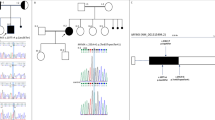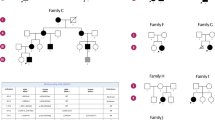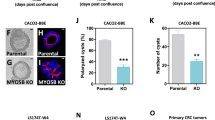Abstract
Megacystis-microcolon-intestinal hypoperistalsis syndrome (MMIHS) is characterized by marked dilatation of the bladder and microcolon and decreased intestinal peristalsis. Recent studies indicate that heterozygous variants in ACTG2, which codes for a smooth muscle actin, cause MMIHS. However, such variants do not explain MMIHS cases that show an autosomal recessive mode of inheritance. We performed exome sequencing in a newborn with MMIHS and prune belly phenotype whose parents are consanguineous and identified a homozygous variant (c.3598A>T: p.Lys1200Ter) in MYH11, which codes for the smooth muscle myosin heavy chain. Previous studies showed that loss of Myh11 function in mice causes a bladder and intestinal phenotype that is highly reminiscent of MMIHS. All together, these observations strongly suggest that loss-of-function variants in MYH11 cause MMIHS. The documentation of variants in ACTG2 and MYH11 thus points to the involvement of the contractile apparatus of the smooth muscle in MMIHS. Interestingly, dominant-negative variants in MYH11 have previously been shown to cause thoracic aortic aneurism and dilatation. Different mechanisms of MYH11 disruption may thus lead to distinct patterns of smooth muscle dysfunction.
Similar content being viewed by others
Log in or create a free account to read this content
Gain free access to this article, as well as selected content from this journal and more on nature.com
or
References
Berdon WE, Baker DH, Blanc WA, Gay B, Santulli TV, Donovan C : Megacystis-microcolon-intestinal hypoperistalsis syndrome: a new cause of intestinal obstruction in the newborn. Report of radiologic findings in five newborn girls. AJR Am J Roentgenol 1976; 126: 957–964.
Granata C, Puri P : Megacystis-microcolon-intestinal hypoperistalsis syndrome. J Pediatr Gastroenterol Nutr 1997; 25: 12–19.
Lashley DB, Masliah E, Kaplan GW, McAleer IM : Megacystis microcolon intestinal hypoperistalsis syndrome: bladder distension and pyelectasis in the fetus without anatomic outflow obstruction. Urology 2000; 55: 774.
Mc Laughlin D, Puri P : Familial megacystis microcolon intestinal hypoperistalsis syndrome: a systematic review. Pediatr Surg Int 2013; 29: 947–951.
Wangler MF, Gonzaga-Jauregui C, Gambin T et al: Heterozygous de novo and inherited mutations in the smooth muscle actin (ACTG2) gene underlie megacystis-microcolon-intestinal hypoperistalsis syndrome. PLoS Genet 2014; 10: e1004258.
Srour M, Chitayat D, Caron V et al: Recessive and dominant mutations in retinoic acid receptor beta in cases with microphthalmia and diaphragmatic hernia. Am J Hum Genet 2013; 93: 765–772.
Rayment I, Rypniewski WR, Schmidt-Base K et al: Three-dimensional structure of myosin subfragment-1: a molecular motor. Science 1993; 261: 50–58.
Krendel M, Mooseker MS : Myosins: tails (and heads) of functional diversity. Physiology (Bethesda) 2005; 20: 239–251.
Morano I, Chai GX, Baltas LG et al: Smooth-muscle contraction without smooth-muscle myosin. Nat Cell Biol 2000; 2: 371–375.
Zhu L, Vranckx R, Khau Van Kien P et al: Mutations in myosin heavy chain 11 cause a syndrome associating thoracic aortic aneurysm/aortic dissection and patent ductus arteriosus. Nat Genet 2006; 38: 343–349.
Thorson W, Diaz-Horta O, Foster 2nd J et al: De novo ACTG2 mutations cause congenital distended bladder, microcolon, and intestinal hypoperistalsis. Hum Genet 2014;133:737–742.
Milewicz DM, Ostergaard JR, Ala-Kokko LM et al: De novo ACTA2 mutation causes a novel syndrome of multisystemic smooth muscle dysfunction. Am J Med Genet A 2010; 152A: 2437–2443.
Acknowledgements
JLM is a National Scientist of the Fonds de Recherche du Québec-Santé (FRQS), MES is supported by the CHU Ste-Justine Research Centre and also Genome Canada and IT received a scholarship from the RMGA (Réseau de médecine génétique appliquée du FRQS). We thank the members of the RMGA bioinformatic team (Alexandre Dionne-Laporte, Dan Spiegelman, Edouard Henrion and Ousmane Diallo) for the bioinformatic analysis of the exome-sequencing data. This work was supported by March of Dimes (grant no. 12-FY10–236 to JLM).
Author information
Authors and Affiliations
Corresponding author
Ethics declarations
Competing interests
The authors declare no conflict of interest.
Additional information
Supplementary Information accompanies this paper on European Journal of Human Genetics website
Supplementary information
Rights and permissions
About this article
Cite this article
Gauthier, J., Ouled Amar Bencheikh, B., Hamdan, F. et al. A homozygous loss-of-function variant in MYH11 in a case with megacystis-microcolon-intestinal hypoperistalsis syndrome. Eur J Hum Genet 23, 1266–1268 (2015). https://doi.org/10.1038/ejhg.2014.256
Received:
Revised:
Accepted:
Published:
Issue date:
DOI: https://doi.org/10.1038/ejhg.2014.256
This article is cited by
-
Exploring the complexities of megacystis-microcolon-intestinal hypoperistalsis syndrome: insights from genetic studies
Clinical Journal of Gastroenterology (2024)
-
Use of whole genome sequencing to determine the genetic basis of visceral myopathies including Prune Belly syndrome
Journal of Rare Diseases (2023)
-
The genetic basis of congenital anomalies of the kidney and urinary tract
Pediatric Nephrology (2022)
-
Compound heterozygous variants in MYH11 underlie autosomal recessive megacystis-microcolon-intestinal hypoperistalsis syndrome in a Chinese family
Journal of Human Genetics (2019)



